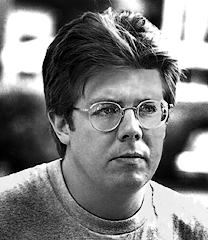- The Breaks: searchable database of samples used in pop music.
- The Amen break: the most frequently used sampled drum loop in hip hop (with sample).
- 20 minute historical video of the Amen break.
- Most prolific film composers.
- The Functions of Film Music.
- The role of video game music.
- Classical Theme Music in Radio, TV and Film.
- Classical Music in Cartoons, Movies, Commercials: a list of tracks where children are most likely to have first heard them.
- A comprehensive organ roll list.
- Identifying a record by its grooves.
Month / December 2006
Taxi Driver: A Romantic Comedy
RIP Peter Boyle
The “It’s Getting Close to Xmas and My Corpus Wanes” Roundup
- OGIC on Aguirre: The Wrath of God.
- The Australian‘s book coverage ain’t bad these days. Recently, they enlisted a number of writers to mention what they’re currently reading.
- Book critics are rated at Time Out. I’ll go further than my colleague Scott Esposito and suggest that any list which seriously considers Michiko Kakutani’s venomous tirades and Janet Maslin’s “Well, good golly, I read a book this summer!” reviews is worthless. And where, pray tell, is James Wood?
- It appears Malcolm Gladwell has follicle competition from
Chris EatonGeorges Perec. Aside from this pedantic and wholly unnecessary observation, Eaton appears to be a writer to check out. - Jack Shafer and Amardeep Singh offer contrarian views on the McEwan/Andrews flap.
 Is there any real reason to revisit Home Alone? Bad enough that this treacly nonsense launched the career of Macaulay Culkin and gave that sentimental hack Chris Columbus a second wind, steering him into the wholesale corruption of Harry Potter. But Home Alone also signified screenwriter John Hughes’ total capitulation into commercial family film fare of the lowest common denominator. Look at the list of films Hughes wrote after Home Alone: Beethoven (under a pseudonym), Dennis the Menace, Baby’s Day Out, and remakes of Miracle on 34th Street, 101 Dalmatians and Flubber. All of these scripts came from a man who desired a summer retreat at Nassau more than a desire to entertain. Imagine a parallel universe in which John Hughes continued writing comedies along the lines of Planes, Trains & Automobiles and the underrated She’s Having a Baby, not letting the lackluster reception of She’s Having a Baby get in the way. Hughes, dare I say it, could have been a fiercely independent populist. But he opted out. And it’s no surprise that Kevin Smith filled in the gap.
Is there any real reason to revisit Home Alone? Bad enough that this treacly nonsense launched the career of Macaulay Culkin and gave that sentimental hack Chris Columbus a second wind, steering him into the wholesale corruption of Harry Potter. But Home Alone also signified screenwriter John Hughes’ total capitulation into commercial family film fare of the lowest common denominator. Look at the list of films Hughes wrote after Home Alone: Beethoven (under a pseudonym), Dennis the Menace, Baby’s Day Out, and remakes of Miracle on 34th Street, 101 Dalmatians and Flubber. All of these scripts came from a man who desired a summer retreat at Nassau more than a desire to entertain. Imagine a parallel universe in which John Hughes continued writing comedies along the lines of Planes, Trains & Automobiles and the underrated She’s Having a Baby, not letting the lackluster reception of She’s Having a Baby get in the way. Hughes, dare I say it, could have been a fiercely independent populist. But he opted out. And it’s no surprise that Kevin Smith filled in the gap.- The year’s most notable newspaper corrections.
- Editor & Publisher compares the NYT and Post responses to Pinochet’s death.
- Sacha Baron Cohen as Best Actor? The critics in my town are often a bit batty, but this choice is a bit silly in a year that featured Ryan Gosling in Half Nelson.
- Who knew that Mary Todd Lincoln’s cake holds all the answers for historical novelists?
- In a perfect universe, Jonathan Ames, George Saunders, and Lydia Millet would be writing episodes for a groundbreaking Comedy Central series, drawing larger audiences to their often hilarious bodies of work. But since we live in a cruel and unfair universe where the spoils often go to no-talent, misogynist thugs, it is, of course, Tucker Max who yields the glory. (via Slushpile)
- Michael Moorcock on Against the Day. (via The Dizzies)
- Overrated and underrated books of the year. Which brings up another point. There was considerable excitement about David Mitchell’s Black Swan Green early this year, but it appears that the end-of-the-year listmakers have forgotten about it. What happened? Or are the critics’ memories too fickle? The only lists I’ve seen BSG on are Mr. Sarvas’ and Mr. Orthofer’s.
- Aw man. Peter Boyle has died.
- Extraordinary claims require extraordinary evidence. But I’m a big fan of the brass balls cultural declaration. Spencer Somers believes that “Sufjan Stevens is the closest thing this generation has to a Brian Wilson.” (via LHB)
If This is the Best Title She Could Come Up With, Imagine the Screenplay
Hollywood Reporter: “Can an unknown actress-turned-writer dance her way to stardom?…’Possum Trot Cloggers’ is the name of the project for which Fowler hoped to drum up interest.”
My Publishing Industry Prediction for 2007
Pardon me while I go into John Dvorak mode.
Google will buy a publisher before the end of 2007. And given certain Bertelsmann grumblings about profit, I have a feeling it may be Random House.
I could be totally wrong on this, but consider the amount of amount of time and money Google has sunk into Google Book Search. Consider also Google’s aggressive efforts to find out what Microsoft and Amazon are doing. And what better way to sidestep publishers’ quibbles over GBS’s copyright infringement and apparent cut into sales than to buy the publishers outright?
Furthermore, one must consider the financial payoff of the Google Book Search feature. Surely, this is a company that cannot be conducting all this out of philanthropy. One stalwart way to recoup costs is through a print-on-demand feature, one publicly available in bookstores. And what better way to approach booksellers than by purchasing a publisher who has a vested history of doing business, thereby pushing whatever POD (or, perhaps, an ironically named GOD) features through a distributor that the booksellers have a history doing business with?
Of course, all this is speculation. But if this all goes down, you heard it hear first.
Richard Powers on Fresh Air
I haven’t listened to it yet, but this should be interesting. (Thanks, Matthew!)
Those who are having trouble with the feed (as I am) might want to try this link.
[UPDATE: Listening to it now. Terry Gross has actually compared The Echo Maker with Invasion of the Body Snatchers. Good lord, Curtis White was right.]
Flit
Flat
Roundup
- David Lynch is launching his own coffee. (via Matthew Tiffany)
- Mr. Asher also doesn’t think too highly of Donadio’s most recent article, suggesting that Donadio “is just writing like Snoopy in his ‘dark and stormy night’ mode.” I agree with him that Ozick’s article is well worth your time.
- Jack Butler, whose Jujitsu for Christ you must check out (thank you kindly, Rake and Carrie), offers this tribute to Don Harrington. Word on the street is that Butler’s got another novel in the works, but I haven’t yet had the opportunity to confirm this info. (via Pretty Fakes)
- It seems that Mel the Anti-Semite is ripping off Indiana Jones and the Temple of Doom. (via Gwenda)
- Salon lists the best debuts of 2006. The big question: Will the Pessl haters, who have been showing up at Mark’s place in droves, now call for Laura Miller’s head? Love or hate Special Topics, I fail to understand the knee-jerk dismissals associated with this book. Many literary folks, including Meghan O’Rourke, seem more content to resort to generalizations (Highly self-conscious prose? What writer doesn’t write self-consciously?), hating this book without citing specific examples. Yet to appear from these apparent detractors: detailed or level-headed assessments on why Marisha Pessl is apparently this year’s literary Beezelbub. So the book was written by a hot young talent and received a lucrative advance. So the book was selected by the NYTBR as one of the Top 10 Books of the Year. I don’t see what any of these factors have anything to do with considering the book’s merits or lack thereof (witness Gawker’s superficial dismissal, for example), but I suspect the early wave of Pessl pecking (or perception thereof) spawned this completely unnecessary turbulence. Is a novelist, by dint of her gender, not permitted to pursue a novel of ideas in the 21st century?
- Chunkster Challenge? I’m reading two books over 700 pages simultaneously right now. 400 pages? 400 pages? I’ll see your 400 pages and raise you 200 more! You want a challenge? I unearth the Super-Chunkster Challenge: at least four books over 600 pages between the time period of Jan. 1 and June 30, 2007! And I’ll do this in tandem with any additional reading challenges sure to crop up during the next year. More details to come.
- Behold: WKRP on DVD.
A Case Against the Wii, A Case FOR Lazy Gamers
Slate: “After a few whacks, I realized that the Wii isn’t asking me to simulate a realistic swing. There’s no reason to assume a batter’s stance, and no reason to bother swinging the controller fast or following through—flicking the controller like a pingpong paddle works just as well. This is the Wii’s biggest letdown—you don’t need to stand up, leap around, or otherwise leave the warm embrace of your couch. The console senses motion, but compared with the full-body workout of a game like Dance Dance Revolution, you’re not getting any kind of exercise at all.”
How to Make Bil Keane Not Suck As Much
Then Again, This is Hemingway We’re Talking About
Philip Gourevitch: “The interviews were invented, or devised, or struck upon, as a response to that challenge. How are we going to talk about writing without doing Lit Crit? So it’s very funny that in the process of doing an interview Plimpton gets clocked by Hemingway for doing Lit Crit.”
Dickens: A Man After My Own Heart
Ireland Online: “A Christmas Day letter penned by the author of A Christmas Carol is up for sale at a US auction house. But the letter written by Charles Dickens on December 25, 1849, contains a good deal more ‘bah humbug’ than Christmas cheer.”
Top Ten Ain’t Nothin’
You want end-of-the-year lists? Miriam Burstein posts a delightfully taxonomic year in reading list containing such intriguing categories as “Best Victorian fiction not read previously,” “Most bizarre Anglican didactic novel acquired this year,” and “Paragraph that probably caused a number of Victorian Catholic readers to roll their eyes in disbelief.”
Sam Raimi’s The Shadow!
Reuters: “After a lengthy negotiation, the studio has acquired the screen rights to ‘The Shadow,’ the legendary 1930s pulp hero, for a big-screen adaptation to be produced by Raimi and Josh Donen through their Buckaroo Entertainment banner. Raimi is not attached to direct at this time.”
Newsday Now Bleeding?
Editor & Publisher: “More than 100 newsroom employees at Newsday signed a protest letter sent Monday to Tribune Company Chairmen Dennis FitzSimons, which claims the company has ‘damaged Newsday as an instrument of public information and accountability’ and ‘attempts to increase its profits are dulling Newsday’s brand.'”
R.K. Narayan, Overlooked?
In this week’s New Yorker, Wyatt Mason serves up a R.K. Narayan profile. For more info on Narayan, check out Jhumpa Lahiri’s essay, which appeared a few months ago in the Boston Review, as well as Pankaj Mishra’s 2001 NYRB essay, and Nandan Datta’s biographical overview. More links can be found here.
Rachel the Hack: The Closest Reader

It’s time for a new installment of Rachel the Hack, an essential guide to understanding Ms. Donadio’s warblings.
This week’s NYTBR sees Ms. Donadio writing about poetry critic Helen Vendler, a subject who might just be as humorless as Donadio. Donadio sets the article’s tone with a few clipped sentences (“Sunlight plays on ivy-covered brick,” etcetera), suggesting perhaps that this critic is as “literary” as these ragamuffins who dare to pen verse while starving in frosty garrets. Alas, Donadio is not Hemingway (and I’d hazard a guess that she ain’t exactly starving), no matter how many times she might have read The Sun Also Rises.
We learn that Vendler “has an extraordinary command of the lyric tradition.” (Does Vendler have groupies too? Who knew?) And, offering us yet another classic Donadio maneuver, Donadio glosses over what this “lyric tradition” might be in favor of Vendler’s clip-on microphone. It’s telling that Vendler’s “soft, Boston-tinged voice” is more important that what Vendler has to say. Sure, Donadio’s going to tell you the phrases Vendler cited in her lecture, but damned if the readers will actually get a sense of how Vendler processed the poetry. Which is, after all, what a critic does.
In fact, I was reading this nonsense wondering why David Orr didn’t talk with Vendler, seeing as how he disagreed with Vendler’s assessment of the Elizabeth Bishop book. Sure enough, Orr’s name is name-checked in Donadio’s article. In other words, Orr, a talented poetry critic very well-equipped to have a provocative interview about poetry with Vendler, was passed over by the likes of Rachel “Let Me Get Up to Speed at the Last Minute” Donadio. No doubt Sam “We Take No Chances” Tanenhaus signed off on this without a single provocative thought.
But no matter. The rest of Donadio’s article is thankfully composed of Vendler quotes, which makes it more readable, when Donadio isn’t trying to tell us exactly what Vendler means. But then we all know that NYTBR house style is to write to your audience as if they are idiots. We’re told that Vendler is “sitting on a chair facing the window and a life mask of Keats,” a typical profile flourish.
The rest of the article, at least, gives us the biographical basics. But then, at long last, Vendler’s connection to the NYTBR becomes apparent and we finally see that this article really isn’t about Vendler at all, but about how “important” the NYTBR is.
There’s one interesting moment where Vendler reveals that she doesn’t review poets under 50 and, instead of challenging this ageism with several questions, Donadio takes in this prejudice with all the predictable elan of an establishment writer sucking up to her establishment subject. Donadio and Donadio’s work, seamlessly intertwined.
No Word Yet on Whether She’ll Be Making Holiday Fondue in the Tombs
Canadian Press: “A woman who used fondue fuel to set her boyfriend’s penis on fire will spend the holidays in jail.”
Sylvester Stallone KOs Sam Tanenhaus
 Sure, you could ask Sam Tanenhaus your questions and watch him ignore any query even remotely critical of the NYTBR. (Tanenhaus, incidentally, has refused mutlple interview requests to appear on The Bat Segundo Show to clarify some of the charges that have appeared on these pages.)
Sure, you could ask Sam Tanenhaus your questions and watch him ignore any query even remotely critical of the NYTBR. (Tanenhaus, incidentally, has refused mutlple interview requests to appear on The Bat Segundo Show to clarify some of the charges that have appeared on these pages.)
But why do that when a former box office titan is cheerily answering everything (and I do mean everything)? Everything from whether Rhinestone or Stop or My Mom Will Shoot! is his worst movie to his revelation that Dolly Parton is the ultimate woman.
From The Dizzies, comes a series of bizarre links to Ain’t It Cool News. Apparently, Sylvester Stallone took it upon himself to answer just about every question that was asked of him. From Dolly Parton to the use of three seashells. I even suspect that if I sent Stallone a package of brownies, he’d actually send a thank you note. Which is more than we can say for Sam “We Take No Chances” Tanenhaus.
Here are the links to Stallone’s ongoing Q&A:
Round 1
Round 2
Round 3
Round 4
Round 5
Round 6
Round 7
Round 8
Round 9
Due to Recent Legal Threats, This Blog Will Now Be Known as “Blog Posts Showing What Happens on Each Synapse of Edward Champion’s Mind”
Georgie Lewis of Tin House writes in with the following news:
The highly anticipated publication of artist/provocateur Zak Smith’s visual homage to Thomas Pynchon’s seminal novel Gravity’s Rainbow took a bizarre turn last week. Pynchon’s publisher, Penguin USA, believing the book’s original title, Gravity’s Rainbow Illustrated: One Picture for Every Page, was misleading, demanded Tin House Books change the title or face a lawsuit. Smith’s book will now be known as Pictures Showing What Happens on Each Page of Thomas Pynchon’s Novel Gravity’s Rainbow, the title of the original series of artwork showcased at the 2004 Whitney Biennial.
Roundup
- It’s common knowledge that John Sutherland is an uninformed assclown. But his latest column (which is even more preposterous if you listen to the computer-speech program parsing his drivel) once again begs the question of why an august publication like The New Statesman would hire a no-nothing dullard to cover books. Why my ad hominem fiesta? Well, it’s no different from Sutherland’s strange and uninformed attack on Richard Powers’ The Echo Maker, a novel that Sutherland calls “dense,” and “fearsomely demanding.” Without citing anything specific to support his tenuous argument, Sutherland further suggests that the broadsheets have no interest in calling it. This all comes from a man who hasn’t even read the book. And if Sutherland’s anti-intellectual tone wasn’t enough for you, he then suggests that the publisher-subsidized Quill Awards were set up as a populist alternative. Instead of kvetching about litbloggers, I think Sutherland should be more concerned about the level of stupidity contained within his own ramblings. (via Galleycat)
- Frank Miller’s drawing chair is being auctioned off.
- In the UK, retail is now facing its worst Xmas season since 1981.
- Forbes details the top-earning authors. No surprise: Dan Brown’s at the top of the list.
- BookFox reports on a Dave Eggers/Deng live “interview.”
- Do MP3s sound awful? (via James Tata)
- I must agree with the Hag that “bitch-perfect” should be used more in reviews.
- Dan Green on the NYTBR Notable Books list.
- The 12 Sexiest Men Who Were Never Alive. (via Gwenda)
- Olive Logan: the first literary agent in America.
- Congratulations, Grandpa VanderMeer!
- Apparently, 50 years of copyright isn’t enough for McCartney & Co. (via Ron Silliman)
- Quiet Bubble has declared 2006 the Year of the Woman.
- “Her stories bristle with names and family connections, with the contents of houses, purses, steamer trunks and cars. And, violating another dictum of workshop instructors, the simplest tale will often be told from more than one point of view and in multiple time frames. She shows a lot, but when it’s necessary, she’s also happy to tell.” Thanks, Tony. The prof grants you a B- for your English 101 essay, but I’ll see you at the arcade to play DDR. Will someone please tell Tony Scott that he is a film critic, not a literary one? (And while you’re at it, you might want to let Janet Maslin know too.)
- The Translation Project will be translating 100 Iranian literary texts to English.
- The Gray Lady reports on a phenomenon I observed almost a year ago: literary spam.
- You think litbloggers are bad? In the ’50s and ’60s, literary groupie Alice Denham got around.
- In Palo Alto, Moliere’s Les Femmes Savantes has been updated to 1936 Manhattan by playwright David Grimm.
- Noir writer Elizabeth Stromme has passed away. Sarah has more.
- Anthony Lane on Apocalypto. And don’t miss the SNL recut.
Not Tom and Ray, But Eli and Renee
Renee has put up her first Booktalk podcast, which apparently replaces cars with books and involves Renee and some guy named Eli responding to various voicemails that people leave about books. In any event, do give them a call at 415-992-8622, tell them about “winter books,” and bemuse them with ten-cent words.
Taris, roi de l’eau
Lindsay Anderson’s Lost Documentary?
 I’m a huge fan of the late underrated director Lindsay Anderson, best known for his remarkable trilogy if…, O Lucky Man! and Britannia Hospital (the first two are masterpieces and unavailable on DVD, a telling sign that the DVD format is inefficient at rectifying the gaping holes in film history, preferring such solid holiday sellers as Full House: The Complete Fifth Season). Lindsay Anderson, perhaps unable to get work in the 1980s, was reduced to helming puff pieces like Wham! In China: Foreign Skies. What I didn’t know was that, earlier this year, an archive of Anderson’s papers revealed the great director’s true intentions. Apparently, Anderson made a documentary showing the clash of Wham’s management with Chinese bureaucracy, hoping to show how Western values had an effect on China. Of the film, Anderson noted that it was made under “arbitrary orders from George Michael, who doesn’t know what he’s talking about …a young millionaire with an inflated ego. I was struck by his total disinterest in China. His vision only extends to the top 10.”
I’m a huge fan of the late underrated director Lindsay Anderson, best known for his remarkable trilogy if…, O Lucky Man! and Britannia Hospital (the first two are masterpieces and unavailable on DVD, a telling sign that the DVD format is inefficient at rectifying the gaping holes in film history, preferring such solid holiday sellers as Full House: The Complete Fifth Season). Lindsay Anderson, perhaps unable to get work in the 1980s, was reduced to helming puff pieces like Wham! In China: Foreign Skies. What I didn’t know was that, earlier this year, an archive of Anderson’s papers revealed the great director’s true intentions. Apparently, Anderson made a documentary showing the clash of Wham’s management with Chinese bureaucracy, hoping to show how Western values had an effect on China. Of the film, Anderson noted that it was made under “arbitrary orders from George Michael, who doesn’t know what he’s talking about …a young millionaire with an inflated ego. I was struck by his total disinterest in China. His vision only extends to the top 10.”
I wonder if Anderson was inspired enough by Jean-Luc Godard’s fascinating 1968 documentary, Sympathy for the Devil, which juxtaposed the Rolling Stones against a study of the revolutionary in Western culture, to make a similar film involving Wham.
[UPDATE: More information from the University of Stirling: “At the start of 1985 he had just returned from Washington DC where he had directed a troubled production of Hamlet which was plagued with problems and closed after a short run…..In a letter to a friend written in January 1986 he explained that he undertook the Wham! project ‘in a spirit of curiosity. Curiosity about China and curiosity about the odd confrontation of China and Wham! – and even a certain curiosity, not very great, about the phenomenon of Wham! itself.'” Also of interest: Anderson’s letter to the crew after Wham pulled him from the project. George Michael and Sony Music hold the rights to Anderson’s version and have prevented it from being seen.]
[UPDATE 2: Amazingly, someone has collected the whole of if.. on YouTube: Part One, Part Two, Part Three, Part Four, Part Five, Part Six, Part Seven, Part Eight (this segment has a corporal punishment long take with incredible blocking), Part Nine, Part Ten, Part Eleven and Part Twelve.]
BSS #85: Kate Atkinson
Author: Kate Atkinson
Condition of Mr. Segundo: Investigating turns of an altogether different sort.
Subjects Discussed: Narrative flow, the difficulty of writing the first 100 pages, perspective, good sentences, discovering the internal monologue, writing about inept men, narrative sadism, similarities between T.C. Boyle and Kate Atkinson, technological references in One Good Turn, “guys” to call on for research, Google vs. libraries, dialogue, the influence of reading while working on a novel, “romps,” British prejudices against genre, the word “jolly,” Case Histories vs. One Good Turn, empathy through the omniscient voice, being pigeonholed because of the Jackson Brodie books, Kate Atkinson’s other voices, the exuberant voice, maintaining a sense of fun, a sense of order, theme vs. plot, morality within One Good Turn, and the Honda Man.
EXCERPT FROM SHOW:
Atkinson: You’re working all day on words. Do you really want to then do words the rest of the time? What I would like to do when I’m not, when I’m really engaged with a book, is to just look at a tree really. But it tends to take the form of looking at television. I just want to look at something that’s not words. Because that’s what you’re doing all day. I mean, I’m really glad I read most of world literature before the age of twenty-one. I would never have time for it now or have the inclination for it, I think. I did my reading when I had the space. And now I don’t have that kind of space.
Glen David Gold Thankfully Not MIA
Bookfox reports on a reading with Glen David Gold which answers a most important question: will Glen David Gold write a followup novel to Carter Beats the Devil? The answer is contained within the Fox’s sly report:
The highlight of the Evening was Glen David Gold, author of Carter Beats the Devil, who read from his new, as-yet-unnamed novel. He said it had been “kicking his ass for the last six years”, and read us the first chapter, which included a lighthouse-manning mother who wished for a disaster to relieve the monotony, her son as a rebellious idealist, and the sighting of a man in a sinking craft at sea who appears to resemble Charlie Chaplin. Afterwards, Gold said that because of the editing process and the period before printing, the novel won’t be out for another two years, give or take six months, which is too bad because we all can’t wait.
BSS #84: Francine Prose
Author: Francine Prose
Condition of Mr. Segundo: Introspective about Xmas realities.
Subjects Discussed: Reading like a writer vs. reading as an escapist, Car Talk, reading People as preparation for reading Chekhov, The Illustrated Elements of Style, diagramming sentences, making grammar fun, academia and the poststructuralist vogue, how theory influences writing, concise writing vs. prodigious writing, Infinite Jest, one-line paragraphs and David Markson, Raymond Carver, Ben Marcus and “experimental” writing, Only Revolutions, literary absolutes, Jackson Pollock, the “show don’t tell” rule, Sherlock Holmes and Nero Wolfe, the Nabokov estate, working on a book too long, the “death” of book culture, puzzle novels, Pynchon, the 2006 National Book Award nominees, not finishing books, William Gaddis, James M. Cain’s Past All Dishonor, James Wood, naturalist dialogue reflecting a historical time, transcribing speech, chapters and blocks of text, pointless detail, and Nicholson Baker.
EXCERPT FROM SHOW:
Prose: People keep telling me that all those vogues for structuralism and poststructuralism and deconstructionism are passing, which couldn’t make me happier. And you know I think that those things have had a very bad effect not only on reading, but on writing. I mean, that is because they encourage people to use jargon. They encourage students to use jargon. I mean, when I teach, one of the assignments that I give is to ask my students to find a passage of jargon — academic jargon, literary jargon, art history jargon — and then translate it back into English, and bring both passages into class. And often the jargon they come up with is theory jargon. Literary theory jargon. So nothing can make me happer than to hear that that’s on its way out.
Samantha Power Applied to Douglas Adams
Friend: The Vogons were misunderstood.
Me: Are you kidding me?
Friend: They wrote poetry.
Me: The Vogons destroyed the planet Earth to make way for an intergalactic bypass. Even accounting for the questionable value of Vogon poetry, how, by any stretch of the imagination, can this action be redeemed? That’s genocide! That’s like Saddam gassing the Kurds!
Verizon Lacks First Grade Math Skills
Remarkable. (via MeFi)

